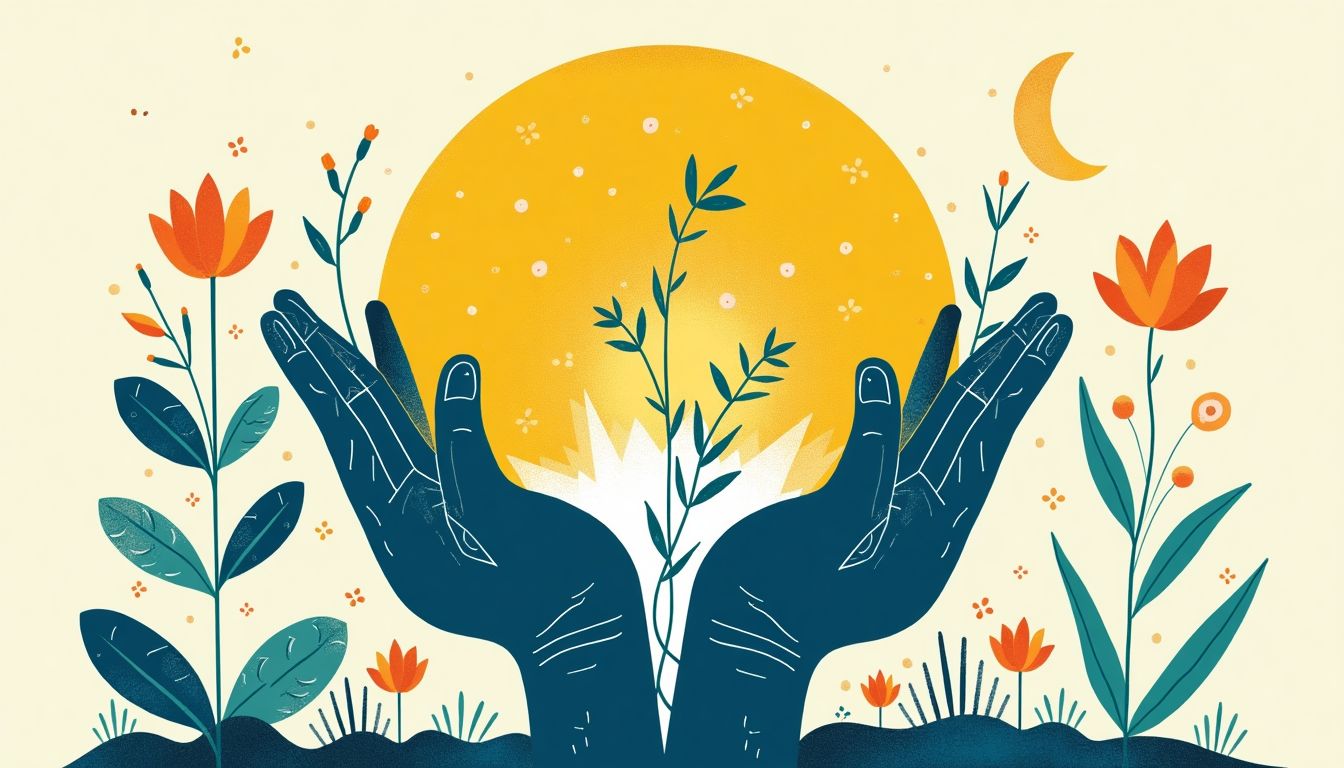The Introduction Title
Life is not about waiting for the storm to pass, but about learning to dance in the rain,
In recent discussions, big names like psychologist Martin Seligman and sociologist Brene Brown have explored the essential role of resilience. They argue that while hardship has traditionally been viewed as the breeding ground for strength, can we nurture psychological fortitude when challenges are less frequent? As technology propels us into an era of comfort, we find ourselves grappling with the question: Are we simply becoming soft marshmallows, or can we mold ourselves into resilient rocks amidst the sweetness of modern life?
This article will navigate the intricate terrain of mental health in a post-work society, focusing on how we can harness resilience without the proverbial struggle. Along the way, we'll uncover adaptive strategies, the role of artificial intelligence in enhancing our mental strength, and practical steps to build emotional fortitude. So buckle up; we're about to embark on a journey through the land of comfort, resilience, and a sprinkle of humor!
1. The Nature of Resilience
Resilience is often viewed as the ability to bounce back from adversity, but that's merely scratching the surface. It's more like a mental Swiss Army knife—equipped with adaptability, mental strength, and emotional regulation. To truly grasp resilience, it’s essential to explore its core components, which will help us understand how to foster it even when life hands us cushy pillows instead of tough punches.
1.1 Psychological Foundations of Resilience
According to the renowned psychologist Ann Masten, resilience is like “ordinary magic.” This concept suggests that resilience isn't just for a select few who’ve faced dire hardships; it's a quality many possess and can cultivate. Masten emphasizes that resilience comes from ordinary, everyday interactions and experiences. It’s about tapping into our inner strength and recognizing the small wins along our journey. In a world where struggle is reduced, how can we leverage the "ordinary magic" of resilience to enhance our mental health?
1.2 The Role of Adversity
Traditionally, many believe that resilience can only be developed through struggle and hardship—like a muscle that grows only when pushed to its limits. However, this perspective is being challenged. Some argue that positive experiences, such as supportive relationships and personal growth opportunities, can also build resilience. It's like cooking; while a little spice (read: adversity) can enhance flavor, a bland dish can still be delicious with the right ingredients (think love, laughter, and community support). The secret lies in combining those everyday luxuries with challenges to boost our resilience meter.
2. The Impact of Modern Society on Mental Health
Modern life is a bit like a double-edged sword, isn’t it? With all our conveniences like instant coffee, smartphones, and that lovely touch of air conditioning, you might think we’re living the dream. But hold on! These comforts can sometimes make us feel even less secure and more anxious. It’s strange, right? In a world where we’re supposedly safer than ever, the mental health challenges we face often feel bigger than ever.
2.1 Economic Security and Its Discontents
Let’s face it: financial stability is supposed to bring peace of mind. But with great power comes… well, great complacency? Dr. Thomas Gilovich, a psychologist at Cornell University, tells us that when people have enough money to fulfill their basic needs, they might stop pushing themselves to grow. You end up cozying up in your comfort zone, binge-watching cat videos instead of challenging yourself to become a better person. Imagine bank account cushion feeling like a warm blanket, but that blanket also weighs you down. It’s an irony we have to deal with, folks!
2.2 The Loneliness Epidemic
Now, on the flip side of those cozy nights in, there's a whole epidemic of loneliness creeping into our comfy lives, and it’s real. Can you believe that a study from the CDC found that so many people feel lonely despite all our connections thanks to social media? Sure, you might have 1,000 friends on Instagram, but how many of those friends would actually help you move? True social connections are more important than ever! Feeling isolated can zap your resilience like a phone battery draining, making it harder to bounce back from any life bumps. We need each other, especially in a society that’s getting increasingly connected yet feels more isolated than ever.
3. Alternative Pathways to Building Resilience
If the struggle is not the only path to resilience, what are some other ways to build that mental muscle? Fear not; there are plenty of exciting pathways to explore! In fact, embracing proactive measures can be just as effective, if not more so, in pumping up your resilience and keeping your mental health in good shape. Think of it like doing squats; we can strengthen our minds without needing to face those heavy weights of adversity all the time!
3.1 Mindfulness and Emotional Awareness
First up is the practice of mindfulness. This is all about paying attention, in the present moment, without judgment. Feeling your breath, noticing the sounds around you, or even just celebrating the taste of your favorite pizza are all acts of mindfulness. Studies show that being present helps you become more aware of your emotions, leading to greater emotional resilience. You become a mental ninja, ready to tackle whatever life throws your way! Who knew being aware of your thoughts could elevate your mental health so much?
3.2 The Role of Community and Support Systems
Next on our list: building community and support systems. It’s like having your cheerleading squad for life! Research shows that strong social networks can greatly enhance resilience. Reach out! Whether it's friends from school, cousins, or even that neighbor who always borrows your lawn mower, having people around you can help. Consider volunteer programs or community groups such as the VolunteerMatch. They create feelings of connection and purpose, which boosts our mental fortitude. Remember, it’s not just about having someone to binge-watch the latest series with; it’s about having that emotional safety net in place when life gets tricky!
4. The Importance of Emotional Intelligence
Emotional intelligence, often called EQ, is critical to building resilience. It helps us understand and manage our own emotions and recognize the feelings of others. This skill can be especially useful when facing challenges or navigating social situations. People with high emotional intelligence can often remain calm even in frustrating situations.
4.1 The Components of Emotional Intelligence
Psychologist Daniel Goleman identified five key components of emotional intelligence:
- Self-awareness: Knowing your emotions and understanding how they affect your thoughts and behavior.
- Self-regulation: The ability to control impulses and mood swings, keeping emotions in check.
- Motivation: Harnessing emotions to pursue goals and challenge yourself.
- Empathy: Understanding the emotions of others, allowing for better relationships and communication.
- Social skills: The ability to manage relationships, persuade, and cooperate with others effectively.
These components work together, much like a team. When you strengthen one area, you can enhance the others, creating a more resilient individual.
4.2 Emotional Intelligence in a Comfort-Driven Society
In today's world, where comforts and conveniences abound, it’s easy to overlook the importance of emotional intelligence. However, high EQ can serve as a buffer against the downsides of too much comfort, such as isolation and boredom.
For instance, people with strong emotional intelligence can:
- Identify when they are feeling unfulfilled and take action to address that feeling.
- Connect more deeply with others, fostering relationships that provide support and joy.
- Use their understanding of emotions to inspire themselves and others, even during tough times.
In essence, emotional intelligence can transform the luxuries of our current world into meaningful experiences that bolster our resilience.
5. Future Perspectives: Redefining Resilience in an Evolving Landscape
As society continues to evolve, so must our understanding of resilience. With rapid technological changes, our concepts of struggle and comfort are also shifting. We need to redefine what it means to be resilient in this modern context.
5.1 The Role of Technology in Resilience Development
Technology is not just about gadgets and apps; it can be a powerful tool for enhancing personal resilience. We can leverage various innovations to support our mental health and emotional strength. Some technology-driven methods include:
- AI-powered mental health apps: These applications can monitor user behavior and offer personalized strategies for stress management.
- Online support communities: Participating in forums or social media groups fosters connections and provides opportunities for sharing experiences.
- Webinars and virtual workshops: These platforms provide access to experts who can teach resilience-building techniques, often at little or no cost.
By utilizing these technologies, we can create a supportive environment where resilience flourishes rather than falters.
5.2 Lifelong Learning and Adaptation as Components of Resilience
As we face a world constantly in flux, the value of lifelong learning cannot be overstated. The ability to learn new skills and adapt is a crucial part of resilience. Here’s why:
- Continuous learning keeps our minds active and engaged, helping to avoid stagnation.
- It encourages curiosity, making us more open to new experiences and ideas.
- Adaptability fosters confidence; the more we learn and grow, the more capable we feel in handling life’s changes.
Whether it’s taking up a new hobby, attending classes, or engaging in self-study, fostering a mindset of lifelong learning can rejuvenate resilience for ourselves and our communities.
6. AI Solutions: How Would AI Tackle This Issue?
As we stand on the precipice of a technological revolution, the potential of Artificial Intelligence (AI) to bolster resilience in a post-work world presents us with a unique opportunity. With machines steadily evolving to learn and adapt, we can leverage their capabilities to support mental well-being effectively and immediately. Imagine a world where AI doesn’t just automate our tasks but becomes an ally in nurturing our mental capacities. Sounds futuristic, right?
AI holds tremendous promise for enhancing our understanding of resilience and providing tailored support systems. Consider the following approaches:
6.1 Personalized Mental Health Monitoring
AI can analyze individual behavioral patterns through data collected via wearable devices or mobile apps. This personalized mental health monitoring can help identify triggers for stress or anxiety, enabling users to take proactive measures to enhance their emotional well-being. For instance, Fitbit offers health tracking that enables users to monitor their daily activity and heart rates, which can serve as an indicator of their mental state.
6.2 Community Engagement Platforms
AI-driven platforms can facilitate community connections, allowing users to engage in resilience-enhancing activities and peer support at scale. By using algorithms to pair individuals based on interests, experiences, and coping mechanisms, we can cultivate a sense of belonging that counteracts isolation. Websites like Meetup enable communities to gather and share experiences, boosting social resilience.
6.3 Chatbots for Immediate Support
Chatbots utilizing cognitive behavioral therapy (CBT) techniques can provide on-the-spot support, guidance, and relevant resources. These bots can engage users in conversations that help identify unhealthy thought patterns, offering strategies to mitigate feelings of despair or stress. A notable example is Woebot, an AI-powered chat companion that helps users work through their emotions.
Beyond these practical applications, let’s consider an innovative approach inspired by the meticulous planning of historical initiatives—such as the Manhattan Project—but adapted for today’s needs.
Actions Schedule/Roadmap (Day 1 to Year 2)
Day 1:
Establish a dedicated research consortium, including psychologists, data scientists, and AI developers from leading institutions like Stanford University and MIT, to explore the integration of AI into mental health.
Day 2:
Compile existing studies on resilience and mental health, focusing on non-adversarial development methods using advanced AI analytics.
Day 3:
Create an AI model to analyze data reflecting society’s resilience indicators, incorporating inputs from mental health professionals and sociologists.
Week 1:
Conduct interviews with diverse demographics, gathering qualitative data on individual experiences with resilience and mental health practices. Engage volunteers through outreach initiatives.
Week 2:
Analyze the data collected during the interviews, identifying common trends, insights, and resilience-building practices.
Week 3:
Host a symposium with community leaders and experts in mental health to discuss findings from the interviews and strategize on effective community support systems.
Month 1:
Draft a comprehensive report outlining key findings and proposed AI solutions that enhance community engagement and mental health support.
Month 2:
Collaborate with technology companies like Microsoft Research and IBM to develop AI-assisted resilience platforms designed for community outreach.
Month 3:
Begin beta testing AI solutions within selected communities to gather valuable feedback. This phase will include developing educational campaigns to raise awareness about the available solutions.
Year 1:
Launch the AI platform publicly, complete with extensive user education aimed at maximizing participation and effective engagement with the support systems.
Year 1.5:
Monitor user engagement and feedback, making necessary adjustments to the AI tools and support systems based on user experiences and technological advancements.
Year 2:
Publish a comprehensive study analyzing the impact of AI on resilience-building. This report will provide data-driven strategies for future implementations, highlighting the use of technology as a foundation for mental health enhancement.
Conclusion: Redefining Resilience in the Age of Comfort
As we traverse through a landscape increasingly defined by ease and technological advancement, the need to redefine resilience takes on critical importance. No longer should we confine our understanding of mental strength to trials and tribulations; instead, we must embrace the idea that resilience can flourish in environments devoid of struggle. By harnessing innovative strategies—ranging from emotional intelligence to the power of AI—we can cultivate resilience that nurtures human potential without the need for hardship. It is time to reimagine what resilience looks like and how it can be fostered in a world where comfort reigns. As we venture into the future, let’s allow the empowering embrace of technology, community, and knowledge to lead us toward a healthier, stronger society.
FAQ
Q1: Can people really build resilience without any struggle?
A1: While traditional views often say that struggle builds resilience, research shows that good experiences can also help us grow stronger. It's not always about facing hard times. For example, Psychology Today highlights that positive experiences, support from others, and learning can also create resilience.
Q2: What are practical steps for building resilience?
A2: There are many ways to build resilience. Here are some simple steps you can follow:
- Practice mindfulness to stay aware of your thoughts and feelings.
- Connect with supportive friends or family for encouragement.
- Take on new challenges to boost your confidence.
- Engage in lifelong learning to keep your mind active.
- Seek professional help if you're struggling with mental health.
Q3: How can technology assist in mental health?
A3: Technology, especially artificial intelligence (AI), can offer great help in mental health. Here’s how:
- Personalized Support: AI can learn what you need and offer tailored advice.
- Community Connections: Online platforms can help you meet people for support groups.
- Instant Help: Chatbots can provide immediate responses to stress or anxiety.
For example, Headspace provides mindfulness and meditation resources that can help you build resilience.
Q4: What role does emotional intelligence play in resilience?
A4: Emotional intelligence helps you understand and manage your emotions. With better emotional intelligence, you can handle stress better and connect more with others. Daniel Goleman, an expert in emotional intelligence, explains that it involves:
- Self-awareness: Knowing your feelings.
- Self-regulation: Controlling your responses.
- Motivation: Using your emotions to reach goals.
- Empathy: Understanding how others feel.
- Social skills: Building strong relationships.
These skills can buffer against negative feelings that sometimes come with a comfortable lifestyle.
Q5: What if I don't like asking for help?
A5: It's okay to feel that way! Many people don’t want to ask for help, but remember, it's a sign of strength, not weakness. Building connections can make us feel less alone. Start small, talk to a trusted friend, or check out groups online that discuss resilience and mental health, such as Beyond Blue.
Q6: Can I build resilience at any age?
A6: Absolutely! Building resilience is a lifelong journey. Whether you’re young or older, it's never too late to start. We all face challenges, and learning to cope and grow from them can help at any stage in life. Engaging in activities like community volunteering or taking up new hobbies can significantly help. The report from NCBI states how these experiences can boost our resilience.
Q7: How do I know if I’m becoming more resilient?
A7: You might notice a few changes in how you handle life’s ups and downs:
- You bounce back quicker after setbacks.
- You feel more confident dealing with challenges.
- You maintain a positive outlook even in tough times.
- You seek support from others more often.
Taking these steps can lead to noticing real changes in your mental strength!
Wait! There's more...check out our gripping short story that continues the journey: Rebellion's Dawn
Disclaimer: This article may contain affiliate links. If you click on these links and make a purchase, we may receive a commission at no additional cost to you. Our recommendations and reviews are always independent and objective, aiming to provide you with the best information and resources.
Get Exclusive Stories, Photos, Art & Offers - Subscribe Today!





























Post Comment
You must be logged in to post a comment.